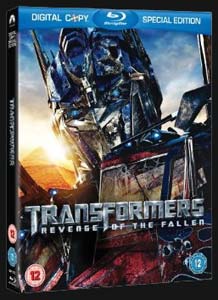|
Click here to return to the main site. Simon Furman (Comic Book Writer) - Transformers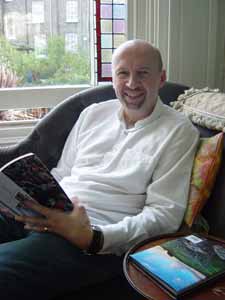 Simon Furman is a comic book writer, who is best known for the body of work he has contributed to the Transformers universe. His work on Transformers has seen him work for Marvel UK, Marvel US, Dreamwave, and, most recently, IDW. He was also responsible for writing the final episode of the Beast Wars: Transformers cartoon series, and the Transformers Ultimate Fan Guide. He currently writes Teenage Mutant Ninja Turtles and Transformers for Titan Magazines in the UK and the US Transformers comic line published by IDW. Darren Rea spoke to Furman about the current state of the Transformers franchise as the new movie, Transformers: Revenge of the Fallen, was released on Blu-ray and DVD... Darren Rea: Why do you think that the Transformers, which is such an iconic franchise of the '80s, has managed to survive for so long and is still a huge hit with kids today?
I think a lot of it, particularly with the movies, is to do with technology. Once you put these things into a technology that makes them happen on the screen - and that couldn't have happened 25 years ago - I think kids these days just kind of accept that straight away. DR: How do you think the stories have managed to stay fresh, especially where the comic books are concerned. How is it that you don't run out of steam as far as story progression goes? And is it harder today to keep the new ideas coming than it was back in the '80s? SF: Back in the day, and the same today, I've always really approached it as a sort of straightforward storytelling - none of this: "Well, they're toys, we can write a load of guys just hitting each other and that will be enough." I think, with Transformers - and this was there before even I became involved - people went to great lengths to give it a depth of story and character. The whole thing was laid out like a big kind of Star Wars universe, almost. Everything was realised, characters had their strengths, weakness and flaws, everything was kind of there. So, when we came on board for the comic, it felt right to print these characters as human characters and tell stories about them as much as we could. DR: We're you surprised by this when you started working on the comic book - that so much attention was being devoted to a kids comic book?
DR: How would you sell the comic book series to someone who hasn't read any of the issues and thinks it's just going to be endless stories about good robots fighting bad robots? SF: I think the first thing is that a lot of it is about robots fighting each other, as the movies typify. That's what your younger audience wants. On the other hand, I've never written down to a younger audience, so into that you layer some serious character ideas, some moral issues and maybe some big sweeping Galactic feel to it that gives it a sort of epic cinema scope feel to it. I think it would be worth burying the preconceptions and just seeing that sometimes these characters are far more than two dimensional machines beings and they kind of have all the frailties and everything else that human characters have. DR: How much have the new movies helped to ignite new interest in the comic book series?
What I think the movies have done, which is the most important thing, is they've brought in a new generation of kids. Transformers has slightly aged with its fans - a lot of people have stayed loyal to it since the '80s or the '90s and there's a sort of diminishing return on that, in as much as you really need new people, new kids, coming in to it to keep it fresh, and I think that's what the movies have done. They've started it up almost bigger than it was in 1984 with a whole other generation of kids and that's going to kind of keep it going for longer. DR: With the comic book series having such a loyal fan base, does that present problems in so much as you can't get lazy and repeat old stories? SF: Yeah, you've got to be careful that you don't just rehash old stories, and sometimes with the best will in the world there are similarities, or someone will say we've had a character that went through that arc before. There are slight knock-ons, but you do have to be aware of that. These days the fans will haul you up on it in a second. The Internet is a huge courtroom in terms of your output and people do tend to jump straight on and say: "I'm sorry, that's been done before". DR: How fanatical are the older fan base. Do they get upset if you treat a character in a way that they're not happy with.
They're meticulous, they're obsessive but most of all they love the property and you have to sit back and appreciate that even though it's maybe not something you're into it's become quite a defining thing to them. DR: What's the state of the UK comic industry at present, and why do you think that it's never been quite as successful as the American market? SF: I honestly don't know why the UK comics industry flounders from time to time. Back in the '80s it was booming and I think there's more of that pre-conception here that comics are for kids and its never quite stepped out of that enough, whereas in America it got an adult audience through minds like Vertigo and Image and a few of the other companies that pushed the boundaries a little more. I think over there it got to that idea where the book crazy came into it and it became a much more acceptable thing. Here it's never quite lifted off in that way. DR: Are you quite open about what you do when you first meet people at social functions, or are you a little apprehensive about telling people? SF: I'm happy to tell people what I do, but it tends to fall into, more or less, two reactions. One is avid interest - where they've got some childhood recollection of comics or Transformers, or they're still a genre fan of some sort. Or you'll find a sort of glazed, "don't really understand that" reaction. There doesn't tend to be much in the middle. DR: Do you think your job keeps you young - or at least a young outlook on life? Do you keep yourself up-to-date with the latest trend in kids comics and games?
DR: What was it like hearing your Doctor Who audio, Axis Of Insanity, come to life? SF: That was amazing. By that point I had done a couple of animation jobs, so I had heard my dialogue spoken, but for the Doctor Who one I was slightly in awe of the fact that I was going to be writing for Peter Davison who I'd watched on TV as a younger man. It was very daunting. I went to the actually recording of it and that, for me, was a quite amazing experience, to see these people actively doing my lines and just how well they did it and how kind they were to me about. It was an amazing experience. DR: Where you on hand to help offer any advice on how the lines should be delivered, or once you'd written it was it out of your hands? SF: There is a certain amount of input, but what I realised on the day was that these people were so professional that they didn't need more than a read through to get the whole thing nailed. DR: What's the one thing in the industry that you're most proud of and what's the one thing outside of the industry that you're proud of?
Outside the industry, it's probably moving slightly sideways into screen writing for films and TV, which I'm doing at the moment. So that feels like another nice evolution. So, while I never want to stop doing comics it's also nice to be opening new doors. DR: Is that progression, from comics to film, a fairly hard one to make? SF: Actually, what I found was, the step between a script for a comic and a script for an animated TV show or even a movie isn't that different, you're still calling shots, laying in dialogue and running characters through their paces. There are formatting and structural differences, but I found it a reasonably easy step to make. It's more satisfying to be able to take your own characters and build them than take somebody else's. But, you know, on the other hand, with the Transformers particularly, I've made half a career of taking characters where there was no characters almost - where they were small toy characters with not much behind them - and try to build those into something. It's kind of nice to start from scratch. DR: If you got fed up with the industry what career do you think you'd move into? SF: I have no idea. If I wasn't writing in some way, shape or form, I really don't know what I'd be doing. I'd love to one of these days, if time ever presented itself, just to move into novel writing. But at the moment it's just too mad busy with everything else.
Transformers: Revenge of the Fallen is available on Blu-ray and DVD from Paramount Home Entertainment from 30 November 2009. Click here to buy this movie on Blu-ray for £16.98 (RRP: £29.99) Return to... |
|---|
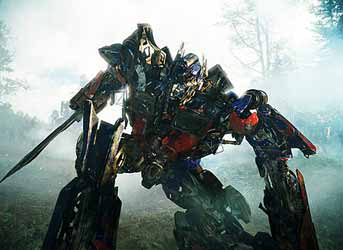 Simon Furman: I think with Transformers the whole nature of the brand changes as the years go by. It sort of makes itself more relevant, more up-to-date. I think the films have really shown that - that just by making things slick and fast and alien and more organic, it's kind of brought a whole new era of kids into it.
Simon Furman: I think with Transformers the whole nature of the brand changes as the years go by. It sort of makes itself more relevant, more up-to-date. I think the films have really shown that - that just by making things slick and fast and alien and more organic, it's kind of brought a whole new era of kids into it.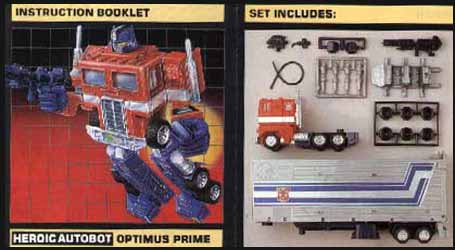 SF: Yeah, I think I was. And if you go back to the very beginning of Transformers, Hasbro kind of inherited these toys without western names or back story from the Japanese company Takara, so it came to them and even they, rather than just throw it out there, decided that it needed something more for kids in the '80s. And they looked to Marvel Comics to flesh the whole thing out - to give it a story and some kind of depth and gravitas and all that. I think that was what differentiated Transformers. Starting out everyone wanted it to be more than just a set of plastic toys that transformed.
SF: Yeah, I think I was. And if you go back to the very beginning of Transformers, Hasbro kind of inherited these toys without western names or back story from the Japanese company Takara, so it came to them and even they, rather than just throw it out there, decided that it needed something more for kids in the '80s. And they looked to Marvel Comics to flesh the whole thing out - to give it a story and some kind of depth and gravitas and all that. I think that was what differentiated Transformers. Starting out everyone wanted it to be more than just a set of plastic toys that transformed.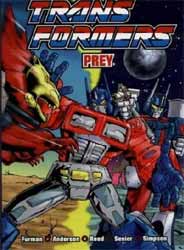 SF: I think quite a lot. I think the comic book audience is a slightly older one that's grown up with it and I think that's fairly loyal and there most of the time. I'm sure that the movies give that a push.
SF: I think quite a lot. I think the comic book audience is a slightly older one that's grown up with it and I think that's fairly loyal and there most of the time. I'm sure that the movies give that a push.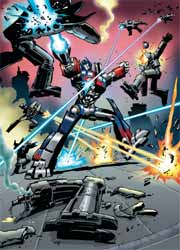 SF: They're passionate about it, let's put it that way. When I first went to a Transformers convention firstly I was staggered by how many people turned up to it, and secondly I was staggered that everybody knew the stuff far better than I did. Every time I stumbled over a reply everyone else knew the answer.
SF: They're passionate about it, let's put it that way. When I first went to a Transformers convention firstly I was staggered by how many people turned up to it, and secondly I was staggered that everybody knew the stuff far better than I did. Every time I stumbled over a reply everyone else knew the answer. 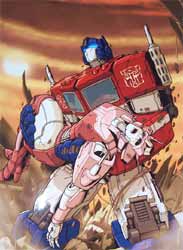 SF: Yeah, it's a great excuse not to grow up. I can sit and watch cartoons, read comics and quite legitimately claim it's research. So, yeah, it does help and also it's always been a passion of mine. I was a comic collector long before I was a comic writer. And even though that waned, I've still got the passion for it that I get.
SF: Yeah, it's a great excuse not to grow up. I can sit and watch cartoons, read comics and quite legitimately claim it's research. So, yeah, it does help and also it's always been a passion of mine. I was a comic collector long before I was a comic writer. And even though that waned, I've still got the passion for it that I get.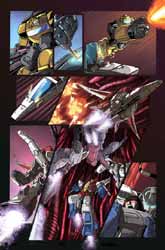 SF: In the industry I have to say it's probably is the body of work I've done on Transformers. I used to sort of kick and struggle a bit against being tagged as Mr Transformers, but these days I think: "Well, it's defined and shaped my career, it's opened other doors and moved me into TV, animation and other comic books and comic book companies..." It's having something that I can actively say to people and most people will have heard of it.
SF: In the industry I have to say it's probably is the body of work I've done on Transformers. I used to sort of kick and struggle a bit against being tagged as Mr Transformers, but these days I think: "Well, it's defined and shaped my career, it's opened other doors and moved me into TV, animation and other comic books and comic book companies..." It's having something that I can actively say to people and most people will have heard of it. 